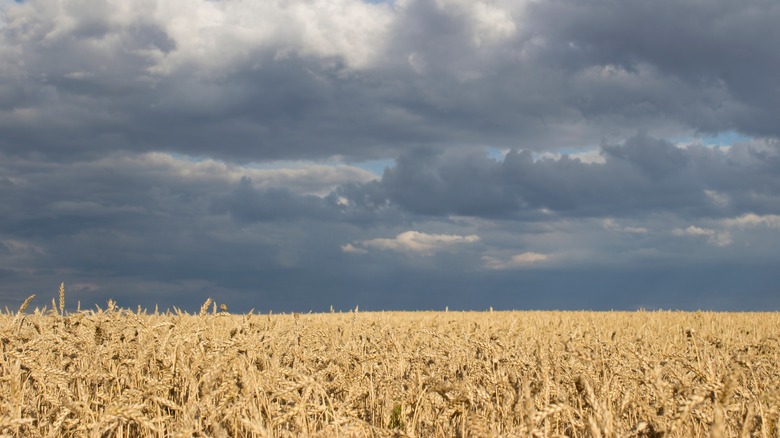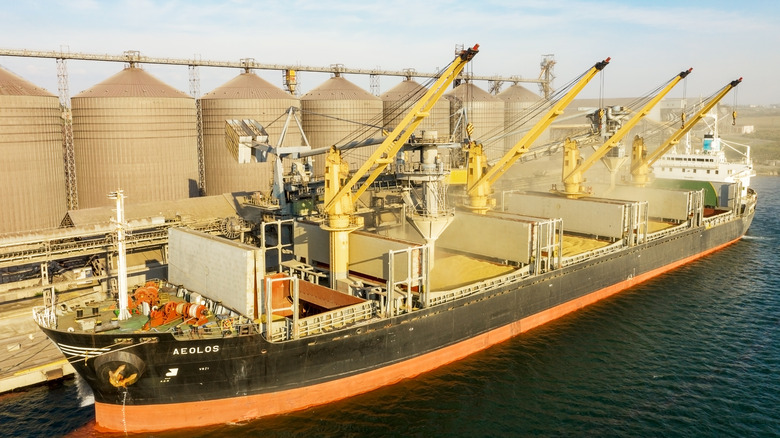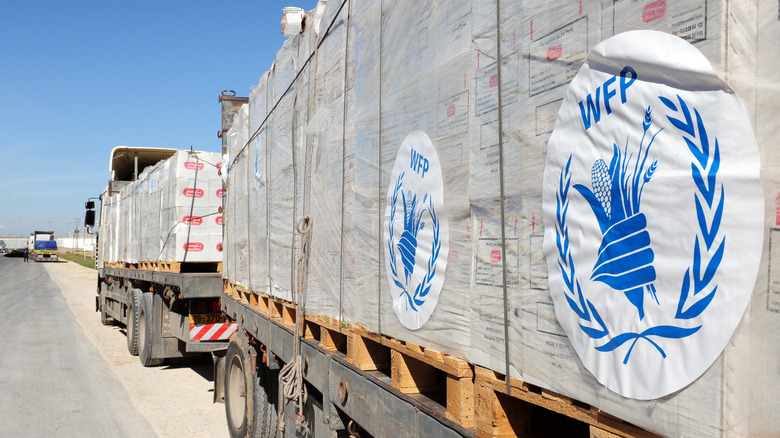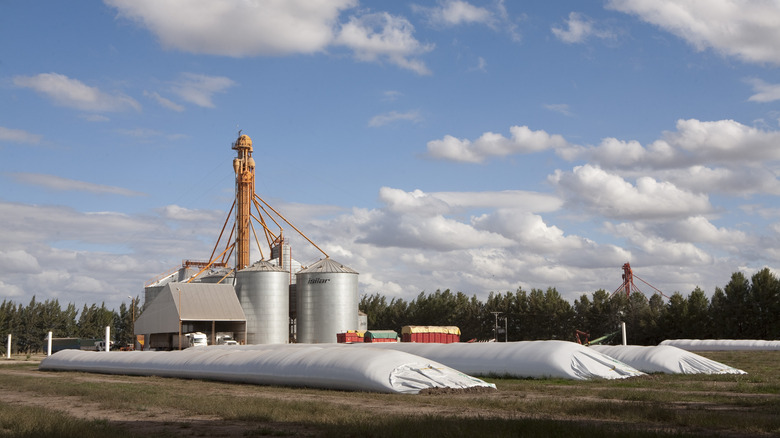The Real Reason Ukrainian Farms Are Running Out Space To Store Crops
Despite the ongoing war that has thrown their country into turmoil since February, Ukrainian farmers are still preparing to begin their wheat harvest in the coming days. Unfortunately, while much of the crop has been unharmed, there may not be enough space to store it. According to Reuters, about 76 percent of the wheat planted in Ukraine in late 2021 is still harvestable and in Ukrainian controlled territory. However, farmers are still in a bind in their efforts to sell it.
Ukraine plays a disproportionately large role in the global food market, despite its moderate size — it is only the 45th biggest country in the world by area according to Worldometer. BBC reports that in 2019, Ukraine accounted for 42% of the world's sunflower oil, 16% of the corn, 10% of the barley, and 9% of the wheat, 90% of which were exported through the country's deep-water ports on the Black Sea, which are currently subject to a Russian blockade.
Vox explains that while much of Ukraine's 2021 wheat crop was sold before Russia's invasion, about 20 million tons of last year's grains are stuck sitting in silos on farms and ports. This means that not only are farmers and exporters losing revenue from unsold materials, which is needed to maintain silos and plant more grains, there is also no place to store the new crops even as the country is finishing a particularly strong growing season, in a year when other nations' crops have struggled.
Blocked shipping routes
According to Vox, much of Russia's strategy in the war has been focused on cutting off Ukraine's trade capabilities. Earlier this year, the Russian army captured the port city of Mariupol in the country's southeast after a fiercely resisted, months-long siege. The primary port city of Odessa has remained firmly in Ukrainian control, however, that has not stopped the Russian navy from blocking access from the port with a fleet of ships.
Attempts to circumvent the blockade have so far been minimally successful. While some exports have been diverted to inland ports along the Danube River or moved over land by truck and train, it is not a thorough solution. Vox reports that the country has only been able to export between 1 and 1.5 million tons of grain per month, as opposed to its prewar exports of 5 million tons per month. The majority of the grain which is being shipped is being taken to ports in Poland and Romania, though there are long backups as barges on the Danube are not built to take the capacity of the sea-faring cargo ships and land borders with the EU require truckers to navigate extensive customs checks. Additionally, according to BBC, railroads in the EU use a different gauge track than those in Ukraine and other former Soviet countries, which requires the cargo to switch trains and frequently creates backups.
Exasperating a food shortage
Without storage space for new crops or the ability to garner revenue from their work, Ukraine's farmers will be unable to plant more grains for the 2023 season. Mexican newspaper Zócalo Public Square reports that Ukrainian farmers are expected to plant 40% less wheat in 2022, a development which could result in a 54% decrease in wheat harvests from 2021 levels in 2023, worsening the food crisis already being created by the war. The UN's World Food Program, an organization dedicated to getting food to struggling countries in Africa and the Middle East, sources about 40% of its wheat from Ukraine, meaning people in those countries, as well as countries like Libya, Egypt, and India, which get significant amounts of food from Ukraine, 49 million by the UN's estimate, according to Vox, could face famine in the coming years. Newsweek reports that Russia is well aware of what it is doing to the world food market and is, in the words of U.S. Secretary of State Antony Blinken, "blackmailing" the world to lift sanctions in exchange for access to Odessa and other ports.
Currently, Turkey, which controls access in and out of the Black Sea, is undergoing negotiations with Ukraine, the UN, and Russia to open shipping lanes, though it is unclear if they will be successful because Russia is demanding an easing of sanctions in exchange for access and Ukraine is skeptical its neighbor will honor any agreements.
Temporary solutions
If Turkey's negotiations to open the Black Sea are successful, a condition the UN and farmers are adamant is needed in order to successfully get grains to a world facing mounting food insecurity and skyrocketing grocery prices, the NATO member has warned it could take months to get the trade routes operational due to the presence of naval mines. According to Vox, Ukraine planted mines along its coast to prevent an amphibious assault on Odessa, but many have broken free — or been set free.
In order to alleviate the situation, the U.S., the U.K., Canada, and the EU are working on plans to provide Ukrainian farmers with temporary crop storage facilities, but it's likely not enough to make up for what has been lost to Russian occupation and old crop storage. Reuters has reported that the first batch of temporary storage is already en route to Ukraine, though it is unclear if the aid is in the form of temporary silos or large, specialized plastic bags, which Bloomberg notes take up significant space themselves.
Politico reported that U.S. President Joe Biden also announced plans for the U.S. and Poland to construct temporary silos on the Ukrainian border to hold grains awaiting shipment. However, the Polish government was quick to point out that such a plan could take months to implement.



